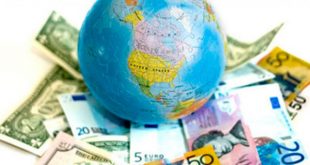By James Kwak Our business and household sectors are losing lots of money every day, and will continue to lose money for the foreseeable future. People no longer spend money at restaurants. Restaurant owners can no longer pay the rent or pay back their business loans. Restaurants fire their workers, who lose their paychecks and can no longer pay their rent, or their credit card bills, or their student debt. In an economic crisis like this, the overriding question is: who ultimately bears...
Read More »Minsky Explains Financial Instability
Michael Stephens | December 10, 2019 In this rare video from 1987 (there is very little surviving footage of Minsky discussing his work), Hyman Minsky summarizes his theory of the financial fragility at the heart of modern capitalist economies: [embedded content] This was part of an event in Bogotá, Colombia (which is discussed in this working paper by Iván D. Velasquez). $title =...
Read More »Physical Gold Withdrawals from the Shanghai Gold Exchange and The New Silk Road Jesse
I would add to government accumulation the likelihood that as incomes rise in the East there will also be increased demand from households. There already is. In the West, physical gold is mostly bling, with much of the saving in gold held largely in derivates as financial saving. And, as Jesse observes, the "paper gold" — "digital gold" really — is an issue owing to hypothecation and re-hypothecation. In the East physical gold doubles as ornament and real saving. In addition, in...
Read More »European banks and the global banking glut
In a lecture presented at the 2011 IMF Annual Research Conference, Hyun Song Shin of Princeton University argued that the driver of the 2007-8 financial crisis was not a global saving glut so much as a global banking glut. He highlighted the role of the European banks in inflating the credit bubble that abruptly burst at the height of the crisis, causing a string of failures of banks and other financial institutions, and economic distress around the globe. European banks borrowed large...
Read More »Financial Crisis & Fraud – A Guide with former Financial Regulator William Bill Black
NEP’s Bill Black appears on acTVism from Munich (in English) to define and talk about the role of a financial regulator. The discussion then turns to financial crisis – S&L debacle as well as the 2008 crash.[embedded content] [Translate]
Read More »Inequality and Stagnation by Policy Design
By Thomas Palley (guest blogger)This paper argues the mainstream economics profession is threatened by theories of the financial crisis and ensuing stagnation that attribute those events to the policies recommended and justified by the profession. Such theories are existentially threatening to the dominant point of view. Consequently, mainstream economists resist engaging them as doing so would legitimize those theories. That resistance has contributed to blocking the politics and policies...
Read More »Mark Hulbert — This still looks like just a stock-market correction, not something worse
The stock market’s recent correction has been more abrupt than you’d expect if the market were in the early stages of a major decline. I say that because one of the hallmarks of a major market top is that the bear market than ensues is relatively mild at the beginning, only building up a head of steam over several months. Corrections, in contrast, tend to be far sharper and more precipitous. 1. For what it's worth, I tend to agree with this position in that the fundamentals of the US...
Read More »Crashed: How a Decade of Financial Crises Changed the World
Book Review Adam Tooze. Crashed: How a Decade of Financial Crises Changed the World. Viking. New York. 2018 The global economic crisis is now more than a decade old, and is far from definitively behind us. Indeed, many fear, with good reason, that the recent, uneven and lethargic global recovery may soon come to an end, and that the next crisis of global capitalism could be even worse than that of 2008. The financial crisis and resulting crisis of the real global economy triggered by the...
Read More »10 years after – and nothing has changed.
The following is an interview with Yena Yoon – a financial journalist with Chosen Ilbo “the largest newspaper in South Korea” conducted on 12 February, 2018, but still relevant. What is the most remarkable change in financial market after 2008 global crisis do you see? Why do you think so? The most striking outcome from the global financial crisis of 2007-9 was that there was no structural change to the international financial architecture/system – the system that was at the heart of the...
Read More »The BBC’s Cassandras of the Crash
On Wednesday, 19th September and again on 22nd September, the BBC broadcast an interview in which I participated. It was called Cassandras of the Crash. The programme is available on the BBC’s Radio 4 website, with the following introduction. “Ten years ago, in autumn 2008, the world watched as the biggest financial meltdown in history unfolded. The crash plunged the world into recession, lost millions of families their homes and its shadow still hangs over our politics today. And when the...
Read More » Heterodox
Heterodox


